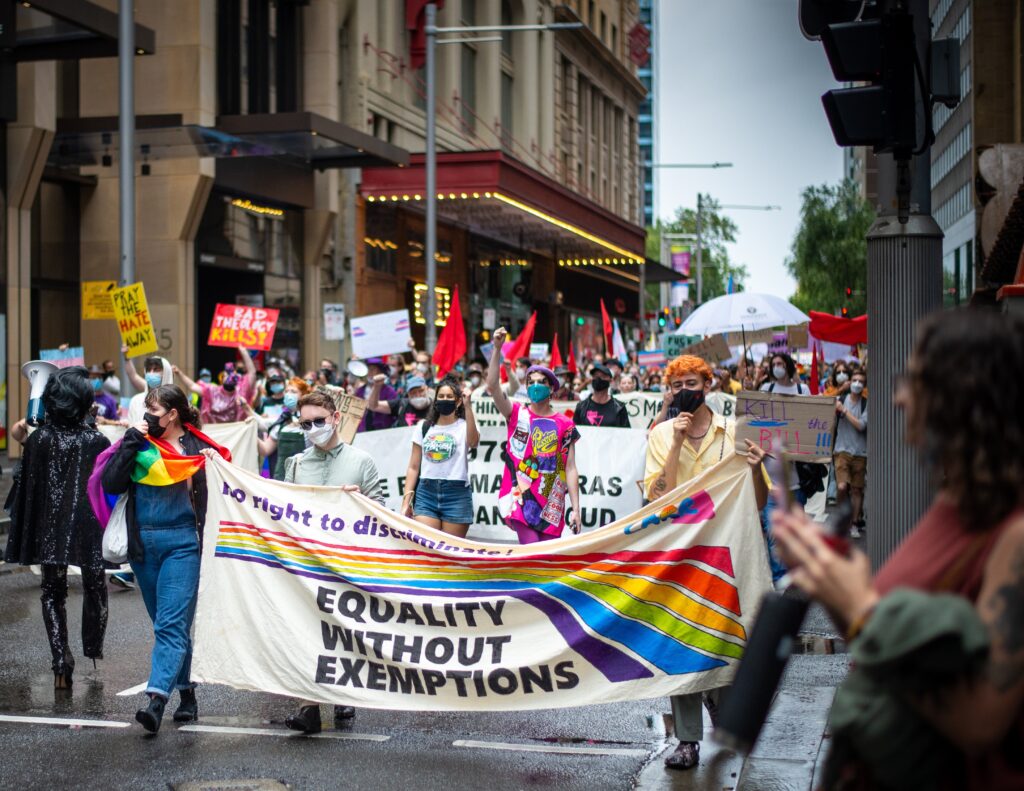In response to the National Day of Prayer, observed annually on the first Thursday in May, the progressive American Humanist Association (AHA) created the National Day of Reason to affirm their belief that religious ideology should not influence laws and government policies. The AHA represents a common assumption when it comes to the relationship between religion and politics: religious affiliation aligns with conservatism, whereas religious “Nones” (who are not affiliated with religion) tend to be politically liberal.
There is perhaps no arena where these assumptions are more pronounced than in debates over LGBTQ rights. In popular stereotypes, sex and religion seem like oil and water, refusing to mix.
Comparing Religious and Non-Religious Americans’ Support for LGBTQ Equality
Based on national surveys conducted by PRRI in 2021 and 2022 with over 7,500 respondents, it’s clear that non-religious Americans overall are much more supportive of LGBTQ equality than their religious counterparts.[1] Nearly 65% of the unaffiliated strongly favor laws that protect LGBTQ people against job discrimination, compared to 40% of religious Americans.[2] When it comes to same-sex marriage, over 70% of the unaffiliated strongly favor compared to 33% of religious Americans. These patterns continue in questions about requiring transgender people to use bathrooms that align with their sex assigned at birth and whether small business owners should be allowed to refuse services to gay and lesbian people. The unaffiliated are much more likely to strongly oppose these measures than those who are religiously affiliated.
At the same time, both religious and non-religious Americans are broad and diverse groups. For one, PRRI data reveal that white evangelical Protestants stand alone in their strong opposition to LGBTQ rights. Religious Americans who are not white evangelicals are about twice as likely to strongly favor nondiscrimination laws and same-sex marriage, strongly oppose business owners’ refusal to serve gays and lesbians, and limiting the bathroom rights of transgender people.
Even taking white evangelicals out of the picture, Nones are still more supportive than religious Americans of these measures of LGBTQ equality. And yet, Nones are not a monolithic group. To the question, “What is your religious affiliation?,” PRRI surveys include three answer categories: Atheist, Agnostic, and “Nothing in Particular” (NIP). When it comes to various measures of LGBTQ rights, atheists are more supportive of LGBTQ rights than are agnostics, and both atheists and agnostics are more supportive than the NIPs.
What explains these differences among American Nones? Looking at where American Nones fall on the political spectrum provides one explanation. It is true that the religiously unaffiliated lean more heavily Democratic than Republican and LGBTQ Americans are more likely to be Nones than their straight counterparts (though it’s worth stating that still the majority of LGBTQ Americans are themselves religious). But again, differences exist even among American Nones with regard to their political orientation. Atheists tend to be more liberal compared to other Nones and Nothing in Particulars (NIPs) tend to be relatively uninvolved in politics. Once political orientation is taken into account, atheists and agnostics do not differ from one another in their support for anti-discrimination laws or same-sex marriage. Yet atheists continue to differ from agnostics and NIPs in their response to religious exemption and transgender rights.
With the number of Nones on the rise, we can expect even greater diversity among this group as well as a greater percentage of Americans as a whole who support LGBTQ equality.
Kelsy Burke, Ph.D., is PRRI Public Fellow and an Associate Professor of Sociology at the University of Nebraska-Lincoln.
Philip Schwadel, Ph.D., is a Professor of Sociology at the University of Nebraska-Lincoln.
Emily Kazyak, Ph.D., is a Associate Professor of Sociology and Women’s & Gender Studies at the University of Nebraska-Lincoln.
[1] Religiously unaffiliated respondents were asked, “Do you identify as agnostic, atheist, or nothing in particular?” In the 2022 AVS, 30 unaffiliated respondents said they were “something else.” In the 2021 AVA, 82 unaffiliated respondents said they were “something else.” Unaffiliated respondents who identify as “something else” are dropped from this analysis.
[2] Religious Americans include white evangelical Protestants, white mainline Protestants, Black Protestants, Hispanic Protestants, white Catholics, Hispanic Catholics, other Christians, and non-Christian religions (Jewish, Buddhist, Hindu, etc.).
